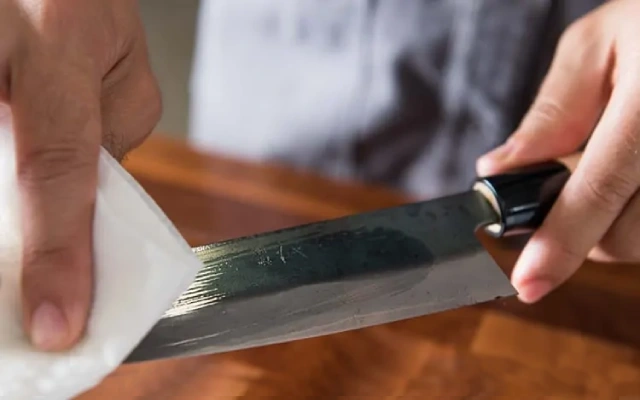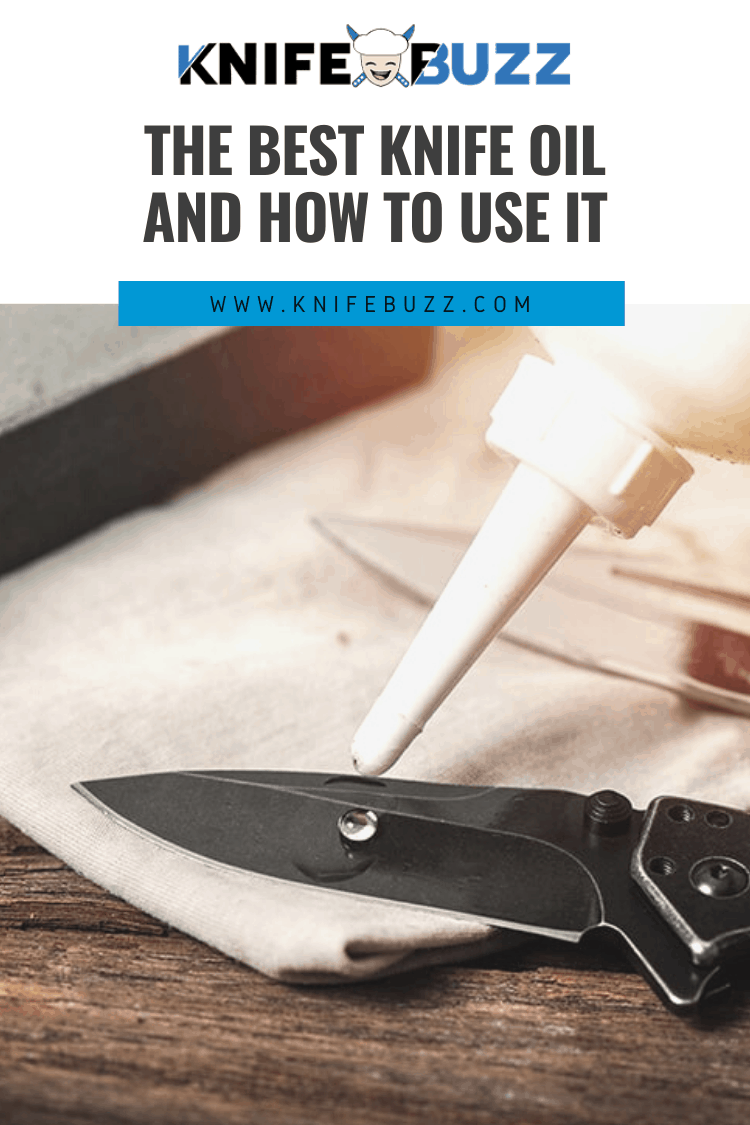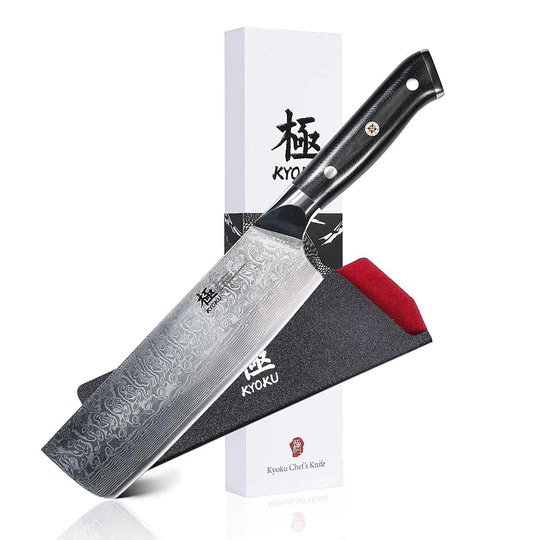


Keeping your knives clean and in good condition is important if you want them to stay sharp and last a long time. And the key to keeping your knives rust free is to regularly oil them.
This buyers guide will help you pick the best oil for your knife collection and also includes handy knife cleaning tips.
My Top 3 Knife Oils

I’ve put together a buyer’s guide to get you up to date with everything there is to know in the world of proper knife maintenance. This guide will (hopefully) answer all the questions you might have about knife oil and review some of the most popular options available.
Also, I’ve included several of the best knife oil products in the market along with their pros and cons. That way, you can compare them and pick the right option for your collection.
Modern knives are made from high-quality steel, but this won’t prevent them from eventually corroding with time. Needless to say, rusting is bad news when dealing with food and will reduce the effectiveness of your knife.
Long term exposure to rough and coarse materials or saltwater can permanently damage your knives. The best way to combat this and keep your knives in optimal condition is to regularly oil them.
Without further ado, here are my favorite knife oils out on the market.

Yoshihiro has a completely safe food-grade purity in its camellia oil. The product comes with a complimentary sabitori rust eraser, which removes rust build-up from the blade and a cloth for easy application of oil.
The bottle contains 3.4 oz. and only a couple of drops are required per use. It is easy to dispense a single drop at a time with the squeezable bottle preventing wasted oil. The viscosity is thick enough to sit on the blade but allows for easy spreading.

The Kurobara knife oil comes in 3.5oz and 8.6oz bottles. The 8.6oz bottle is fitted with a spray nozzle for a quicker and easier application process. The camellia oil is bottled in Japan but comes with fully translated English instructions.
This oil can be applied to any metal part of the knife including screws and grip. Kurobara knife oil is odorless and non-drying.

Citadel Black’s knife maintenance oil is made with 100% food-safe ingredients. This product is made with a blend of white mineral oil and camellia seed oil. It is specially formulated to maintain both steel and carbon steel kitchen cutlery and protect against rust and wear.
This oil is low in viscosity, allowing for an even spread that does not solidify or gum up. Citadel Black is manufactured in the United States.

This product is food-safe certified and contains no harmful or toxic ingredients. Thirteen Chefs knife oil preserves blades by stopping rust from forming through oxidization.
It creates a strong barrier, protecting against humidity and water damage. This oil can be used on high carbon steel knives and is recommended to be used on Japanese knives including Mercer, Global, and Shun.
The oil is completely odorless and taste-free and comes with no allergy risks making this perfect for chefs. Thirteen Chefs oil is produced in the United States.

UltraSource offers a white mineral oil that is non-toxic and non-drying. Their knife oil is colorless, odorless and flavorless, making it perfect for use in kitchens. Its rich consistency makes it an excellent lubricant that can resist moisture.

This oil is available as a single bottle in two, three and four-packs. Tuf Glide does not attract dirt, dust or debris keeping your knife clean and ready to use. The oil doesn’t thicken in cold temperatures or thin in the heat.
This product uses nanotechnology, leaving a protective film over the applied metal surface.

Knife Pivot Lube is specifically designed to oil the pivot and locking mechanism found in modern folding knives. Its high-quality wicking properties mean it penetrated low tolerance, metal-on-metal, and ceramic-on-metal interfaces.
In other words, this will help your knife’s mechanism work as smoothly as possible and reduce resistance caused by rust or wear. KPL uses a synthetic formula that keeps grit, dirt, and contaminants from interfering with the mechanism. This prevents wear and friction from long term use.
An old toothbrush and some soapy water work excellently for cleaning my knives. I then make sure to rinse off my knives in warm water to make sure no soap is left on them. Once this is done, I air-dry my knives for at least fifteen minutes before moving on to the lubricant.
At this stage, it’s time to consider exactly what type of lubricant to use. Knife oils come in a variety of viscosities from very runny to thick, treacle-like liquids.
You’ll want different oils for different applications, and it is important to consider what you want from your knife. If you are oiling the mechanism of a folding knife you may want a different oil than if you were oiling the blade of a kitchen knife.
You’ll also need to consider price points. Some knife oils don’t come cheap so if, like me, you like to keep your wallet strings tight, it’s best to shop around and see what’s the best bang for your buck.
For a more detailed look at some of the options available read my picks above.

Once you have selected and purchased your knife oil of choice, it is time to move on to the final phase. It’s important not to go overboard when applying the lubricant.
Just a couple of drops will go a long way when oiling knives. The aim is to use just enough lubricant to evenly spread across the blade of your knife.
You can use a cloth or a cotton ear bud to apply the oil, whichever you find easier. As always when handling knives, take extra care not to injure yourself when applying the oil. Remember to wipe off any excess oil after the application is complete.
Wooden knife handles are susceptible to rotting and splintering if not properly cared for. Wooden handles come in two different types – stabilized and non-stabilized.
Stabilized wooden knife handles have pores, holes and extra space filled with resin, making the wood water-resistant and less likely to warp or lose form. Non-stabilized knives can swell and sometimes even crack with exposure to excessive water. The upside is that non-stabilized wooden knife handles usually retain a more natural look and feel than the stabilized version.
A mineral oil will protect both types of wooden handles and keep them looking and feeling new for longer.
How often you oil your knives is completely up to you. Some people oil them after every use, some do it weekly, some only yearly and some never oil their knives. Personally, I recommend oiling your knives at least after every second use for best results.
Oiling your knife may cost more in the short term but it will increase the longevity of your knives and keep them in top condition. Trust me, oiling your knives regularly is well worth the effort.
This is the type of oil that is safe to use on kitchen knives as it is able to interact with food without causing any issues. Food grade knife oil is non-toxic, odorless, colorless and flavorless. When searching for knife oil for kitchenware, it is essential that you make sure it is food grade knife oil.
It’s simple really. Keeping your knives well-oiled is paramount to their longevity and high performance. This is not something you can cut corners on, and investment in oils will pay off in the long term. As for which oils to use that are dependent on your personal preferences, requirements and, of course, budget.
The higher price brackets don’t necessarily equate to a better product and they might not be the sort of oils you need. Shop around and decide what it is that will suit your needs and how much you’re willing to spend to get that.
The bottom line is that whatever oil you choose to go with, you will be doing your knives a world of good. Keep them in better condition by oiling them with a suitable product once in a while at the very least.
Thanks for reading our list of the best oils. We hope it will help you choose the ideal oil for your high-quality knife set or collection.

Knife Buzz offers independent product reviews on a wide range of knives used in the kitchen, home, and outdoors. We make it easy for you to find the right knife at the best price.

Knife Buzz offers independent product reviews on a wide range of knives used in the kitchen, home, outdoors and at work.
The Knife Buzz Team are passionate about reviewing knives and we cater to a targeted audience that needs independent advice before purchasing.
KnifeBuzz.com may earn affiliate commissions on some pages of this website. Knife Buzz is a participant in the Amazon Services LLC Associates Program, an affiliate advertising program designed to provide a means for sites to earn advertising fees by advertising and linking to Amazon.com. Amazon and the Amazon logo are trademarks of Amazon.com, Inc, or its affiliates. When you click links to various merchants on this site and make a purchase, this can result in this site earning a commission. Other affiliate programs and affiliations include, but are not limited to, Google AdSense.